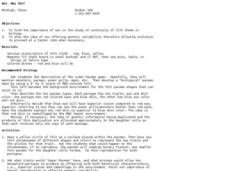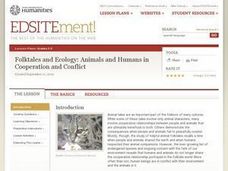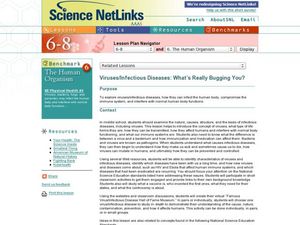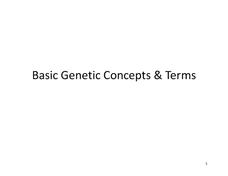Big Kid Science
Measuring Shadows Using an Ancient Method
How did ancient peoples determine the height of really tall objects? Young scientists and mathematicians explore the concept of using shadows to measure height in a hands-on experiment. Paired pupils measure shadows, then calculate the...
K12 Reader
Charge It!
Electrify your pupils' interest in conductors and insulators with a brief reading passage! After reading the text, learners respond to five questions that relate to the content of the passage.
Curated OER
Sports Science
Students explore athletes and how they perform. In this physics lesson, students investigate how physics is involved in sports. Students go online to interactive sites that explain physics and biomechanics. Students also research...
Curated OER
Science: Invent a Gadget
Third graders invent gadgets using simple machine principles. Once they have assembled graphic organizers containing information about their invention, they draw diagrams and explain how their gadget works. Lastly, 3rd graders write...
Curated OER
But, Why Sex?
Learners investigate the importance of sexual reproduction in evolution. In this sexual reproduction lesson plan, students simulate species with two traits: eye and skin color. They determine what characteristics are beneficial for the...
Curated OER
Applying the Laws of Inheritance
Biology and mathematics can be integrated through a study of Mendelian Genetics.
Curated OER
Fantastic Fossils
Students learn about the kinds of fossils and what scientists can learn from them. In this earth science lesson, students are told how engineers and paleontologists work together. Then students create a "fossil fondue" and...
Curated OER
Dinosaur! Fossil Rush: Tale of a Bone
Explore 1870s when a "bone rush" led to amazing discoveries, as fossil-hunters risked life and limb in their quest for dinosaur remains. The class uses the attached visual encyclopedia to prep for a discussion on early paleontology. Two...
Curated OER
Exploring Caves
Students explain why many caves have become National Parks. They determine that caves provide shelter from enemies, and from bad weather in the summer or the winter, and provide certain mineral resources. They discover that ancient art...
Curated OER
Conductors and Insulators
Fifth graders explore conductors and insulators. In this science lesson, 5th graders act as electrons moving through a wire. Students break into groups representing conductors and insulators and explore how they work with electrons.
Curated OER
Folktales and Ecology: Animals and Humans in Cooperation and Conflict
Story elements such as conflict, character analysis, resolution, and moral are discussed and charted as elementary children read folktales involving animals. An element of science is also introduced as learners discover what a keystone...
Curated OER
Catch a Wave. . .
Part of a larger online space science website, this page has a brief explanation of electromagnetic radiation and a chart of wavelengths as compared to common objects. There are four questions to answer about the information. This can be...
ARKive
Butterflies and Blooms
The Northwoods of Wisconsin are lovely in the summer,and they are also home to many flower and butterfly species. Investigate the ways in which seasonal flowers and butterflies are interdependent on each other for survival with a fun...
Curated OER
Bio-What
Students explore the concept of biodiversity. Through activities, they discover the importance of one species upon another. Students examine food webs, discuss animals interdependence upon one another, and brainstorm why biodiversity is...
Curated OER
Illinois Endangered & Threatened Species
Sixth graders identify endangered and threatened species in Illinois. Using fact sheets, they explore why some species are more likely to be on the list than others. Using the internet, they research one species, note its adaptations and...
Curated OER
Kernels of Wisdom: Investigating Natural Variations in Corn
Here is a brain-popper! Corn, or more appropriately, maize, was intentionally domesticated by humans around 9,000 years ago and over a period of hundreds to thousands of years! Genetics and botany researchers have collaborated to find...
Curated OER
Prehistoric Mesosaurus
Students draw conclusions why Mesosaurus has only been found in Africa and Brazil and how its fossil remains serve as important evidence that shows where two continents were once joined together.
Curated OER
Viruses/Infectious Diseases: What's Really Bugging You?
Middle school life science or health classes listen to an audio, visit websites, read different articles, and participate in a class-wide simulation about the spread of viruses. The lesson doesn't get into the mechanics of how viruses...
Curated OER
Stoichiometry
Balancing equations is a foundational skill for starting chemists. There are a few slides in this PowerPoint with colorful diagrams that help to explain how. Unfortunately, the presentation begins with an unrelated table of contents and...
Curated OER
Compare and Contrast Nonfiction Texts
Explore nonfiction writing by comparing and contrasting two different texts. After reading two nonfiction books, articles, or magazines, students utilize a graphic organizer to record their similarities and differences. They answer study...
Curated OER
Hudson Valley Rocks
Learners identify each of the rocks provided and locate where in the valley they are found. They explain why the rocks came to be as they are in each location. In addition, they relate the exercise to how the Hudson Valley's geologic...
K12 Reader
Food Is Our Fuel
After studying a short article about how living things fuel their growth, readers respond to a series of comprehension questions based on the article.
US National Library of Medicine
Basic Genetic Concepts and Terms
Have you ever wondered why you aren't taller or invisible? It all comes down to your dominant and recessive genes. Introduce your class members to genetics with a presentation that includes worksheets for young geneticists to...
Curated OER
Memorable Ways to Cover the Periodic Table
An exploration of the periodic table can lead to a discussion of the scientific process and the ways that our knowledge of this topic evolves and grows.























